Chaplain Livermore’s Rough Sunday at Pittsburg Landing
Chaplain Lark S. Livermore of the 16th Wisconsin had already endured a Sabbath unlike any he'd ever experienced before when on the afternoon of April 6, 1862, he witnessed the frightening breakdown in morale amongst his comrades in the Federal army.
He was starting to dress the wounded arm of his colonel when "a few shells from the enemy dropped amid the promiscuous crowd of thousands on the bank and got up a regular stampede. The whole side hill seemed in motion, making a break for the boats which began just then (as all had steam up) to back off from shore amid the deafening cry, ‘the Rebels are upon us!’ The backing off of the boats heightened the alarm. I handed the Dr. Torry the bowl I was using to catch the blood from the arm of Colonel Allen, fearing for the safety of Charlie with the horses on shore in such an alarming stampede. The gangplank was literally hemmed full and men crowded off into the river in a rush to get on board the boats and away from the advancing foe. The boat backed off just as I came on to the gang and met the rushing crowd and let the gangplank fall into the river. I then thought it was each man for himself and acted accordingly, literally making a bridge of the heads and shoulders of those crowding the gang. I made my way to shore, getting wet only to the top of one bootleg."
Chaplain Livermore's lengthy account of Shiloh, written over the course of nearly two weeks, provides one of the finest descriptions I've yet seen of the chaos of the fighting on April 6th, and speaks to the experience of many Federal regiments that would fight, break, reform, and fight again in position after position throughout that fateful day. This account was constructed by combining Livermore's two accounts of Shiloh published in the Berlin City Courant; one published May 15, 1862 which covers the retreat up until the point he is ordered to the boats, and the second on July 10, 1862 which covers his experiences at Pittsburg Landing among the wounded.
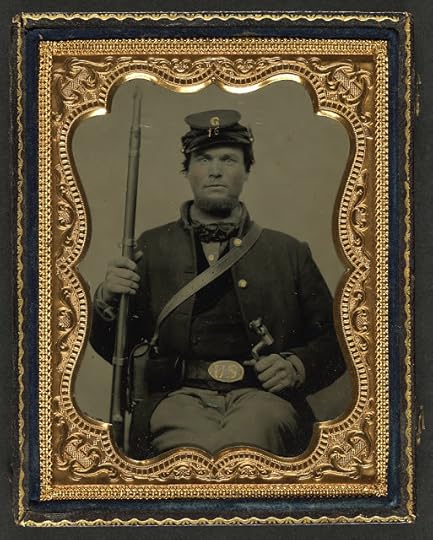 Private Horace H. Smith of Co. G of the 16th Wisconsin Infantry was among Chaplain Livermore's comrades at the Battle of Shiloh. At Shiloh, the regiment's first engagement, the 16th Wisconsin suffered a loss of 245 men killed, wounded, and missing.
Private Horace H. Smith of Co. G of the 16th Wisconsin Infantry was among Chaplain Livermore's comrades at the Battle of Shiloh. At Shiloh, the regiment's first engagement, the 16th Wisconsin suffered a loss of 245 men killed, wounded, and missing. Camp Prentiss, Tennessee
April 18, 26, and 29, 1862
Long ere thiswill reach you, you will have seen and published many versions of our terriblebattle of the 6th instant. But as there are certain items of localinterest to your readers, I will write a brief account as it passed under myown observation.
It was a fair,bright morning and I was going down to the tent of the brass band to give themthe hymns to sing at service at 10 o’clock and met one of our pickets, drivenin by the enemy then not a mile distant from our encampment. As yet at 7 o’clocka.m., none but the earliest risers had been to breakfast and many of theofficers were not up even. General Prentiss’s aide came dashing down on hisfiery steed and ordered all to fall into line of battle. Four of the companies(A, B, C, and D) had been sent out on picket duty to the right of our frontleaving the 16th Wisconsin, 18th Missouri, 61stIllinois, and 18th Wisconsin unpicketed entirely or nearly so,General Prentiss simply saying as I learn by the 18th ‘boys, guardyourselves well in front.’
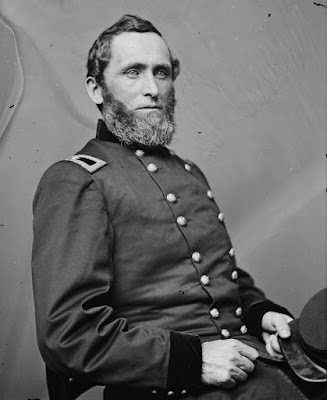 General Benjamin M. Prentiss would be captured later in the day on April 6, 1862 along with about 2,500 men from his division and that of General W.H.L. Wallace.
General Benjamin M. Prentiss would be captured later in the day on April 6, 1862 along with about 2,500 men from his division and that of General W.H.L. Wallace. That a general, whoseheadquarters was not half a mile from where he was first fired at by the enemyshould so leave raw troops (the 18th Wisconsin left the boatSaturday night) and that, too, when from Friday night (so says camp rumor) afight was expected. When I think of the cords of arms, legs, and skulls, not tothink of the thousands of bodies that swell a soldier’s grave, not to speak ofthe innumerable groans and sighs of widows and orphans and the bethrothed ones,words are no images for feelings.
The long roll sounded and in 15minutes, Colonel Benjamin Allen and Lieutenant Cassius Colonel Fairchild wereat the head of the noble 16th Wisconsin, leading them to face theapproaching foe. Adjutant [George M.] Sabin and I mounted our horses togetherand were soon up with our brave boys, for we had not to ride over 800 yards. Anhour before this, those four companies (A, B, C, and D) had met the pickets atour right, skulked in ambush, and received their scattering fire. Here fell,almost at the first fire, our dear friend and most ardently loved Captain EdwardSaxe, shot through the heart. No lingering, tortured death was his. Here alsoin this skirmish Sergeant John H. Williams was shot in the throat or a littleto one side, and the ball came out at the center of the back of his head. Thepoor fellow said, “I am mortally wounded, loosen my belt.” One more breath and allwas over; the spirit left the body.
Both were borne back to CaptainSaxe’s tent and laid like brothers or twins in death, side by side on thecaptain’s pallet. They had fought side by side, having been ordered to joinColonel Moore and take the right flank. They now sleep in death side by side.On Tuesday they were buried by our boys. Their watches, money, and even theirboots were taken by the enemy. They now lie encircled by three trees 18-inchesthrough at the stump, cut off 60 feet high by cannon balls and the topspitching towards their graves as if to do them reverence. Future generationswill mark the spot where they sleep for these oaks will sprout again to standas living sentinels over the dead.
In this picket engagement, ColeySmith, the orderly of Co. A, was dangerously wounded in the shoulder and is nowat Savannah, the ball not extracted. The company deeply feels his loss; he isthe best drill officer in the regiment, a man beloved by all and from hismilitary tact commanded the respect of all. [Orderly Sergeant Smith would dieof his wounds one month later at Keokuk, Iowa, having received a fieldcommission as first lieutenant.]
Now I must describe the openingfire on our front. The 16th Wisconsin passed the open field andformed in line in the thick brush of the parade or review ground of Saturday.Colonel Allen, with characteristic coolness, was cheering his men to nobledeeds, saying to them, ‘now be deliberate and pick your man.’ General Prentissrode by in great haste; I approached him myself and said, ‘Now general, ifthere is anything I can do, call on me.’ He said, ‘Put spurs to your horse and goto my headquarters and tell my aides all are relieved... (this portion of thetext is unreadable unfortunately). I say if honor it could be to carry a dispatchfor a general who would allow himself to be surprised by the enemy in solidcolumn not 800 yards from his headquarters. On my return to him, all was stillmore excited. A small battery came thundering down to our aide as we hoped.
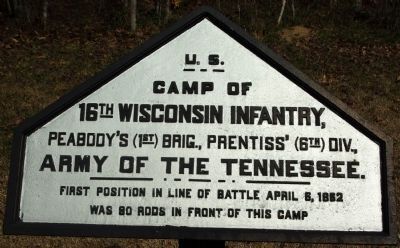 Camp marker for 16th Wisconsin at Shiloh National Battlefield.
Camp marker for 16th Wisconsin at Shiloh National Battlefield. The firing to our right waswaxing warm and Prentiss ordered Colonel Allen and the battery to file rightand march where the firing was warmest. At this juncture, I cast my eye to theleft and perhaps 100 yards off there stood the Secesh army (having risen fromthe ground) with fiery red flag in full view. I rode right up to General Prentissand signaled him to behold the secesh and flag. Colonel Allen also saw them andcited the general that way. From this moment, there was a perfect hailstorm ofbullets. General Prentiss, having ordered the battery to halt, now directed itto ‘file left and fire.’
As this volley was exchanged, Isaw Charlie [his 12-year-old son Charles B. Livermore] and old Kate some 75yards off coming in haste. I rode to him and found he only wished to be with me;I sent him to the tent as he could do no good. Now our boys formed a line thefurther side of the open field and exchanged shots in the thick brush with thefoe. Governor Harvey, when here, went out to this point and saw how the brushwas literally mowed down. He said it ‘seemed as wonder that a single man livedthrough it.’
General Prentiss ordered us tofall back to the trees 25-30 rods across a cleared field ‘in double quick time.’Colonel Fairchild would not repeat the order. He heard it but told the boys tofire again. They delighted to obey his order. But one of Prentiss’s aides camedashing along the whole line, ordered a retreat to the open timber and to firefrom behind the trees. The enemy was advancing by brigades in column threedeep. These are the circumstances under which we retreated. Some of theprisoners taken said they all believed us sharpshooters. Our Belgian rifles,such was the proximity of the armies, would send a ball through their columnthree men deep.
 Lt. Col. Cassius Fairchild, 16th Wisconsin
Lt. Col. Cassius Fairchild, 16th WisconsinWounded at Shiloh
They now rushed on in solidcolumn by brigades and only our men in single file now, having fallen back totheir color line in cool collected order, under their respective colonels. Atthe first firing, Colonel Allen’s horse fell under him. He declined taking him,saying he would have his saddle shifted to his other horse for they werefamiliar with each other’s motions. Adjutant Sabin had ridden the colonel’ssecond horse up to this time. He sent Colonel Allen’s horse to him but thehorse was shot dead just before he got to the colonel. I offered the adjutantmine, but he said, ‘no, the firing is hot. I had as full as live risk myself onfoot,’ and on the double quick he rushed back to the color line.
At about this time, ColonelFairchild received a severe wound in the thigh. He fell at the head of hisregiment and was borne back to the rear. Colonel Allen and Adjutant Sabin werestill cheering the boys to stand firm. But the enemy came in like a flood andPrentiss ordered another retreat, again directing the boys to fire from behindthe trees. This is the way the 16th Wisconsin ran, and the 18thWisconsin also. But they kept up a galling fire as they retreated. LieutenantVail told me he passed many of his men hugging close to the trees and withdeadly aim dropping the enemy, unmindful that they were already outflanked andwould slap them with his sword saying, ‘Boys, you must retreat, the enemy arefar in advance of you.’ This is the way we retreated. We didn’t retreat; weonly fell back to give fight to such overwhelming numbers as would have put usin their pockets in spite of us. Retreat is no name for our action thatmorning; the 16th Wisconsin rallied under their gallant leaderColonel Allen eight times that day.
Colonel Fairchild was shot andColonel Allen’s second horse fell, no regiments were yet coming to our relief,and the little battery that we hoped for as our relief were so excited thatthey did not limber. One of the horses being shot through the back, the horsesbecame unmanageable and ran through our tents in the wildest fury and did more,together with a regiment of cavalry that came rattling through the camp in wildretreat, to awaken a stampede in the regiment that did all the hitherto fire ofthe enemy!
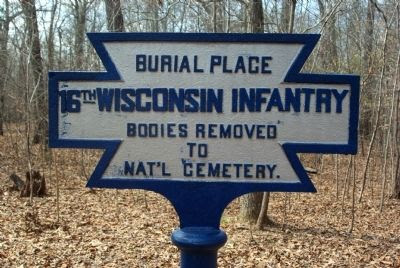
General Prentiss ordered us tofall back and fire from the trees as best we could and we were alreadyoutflanked on our right. The boys obeyed the order, Colonel Allen not repeatingit. He stood facing the enemy with all calmness, sword and person erect as ifon dress parade. He finally turned and walked deliberately away. The sick andwounded were now moving towards the river and the enemy was not amidst ourtents. I saw nothing more of our gallant officers until 12 o’clock. We fellback three-fourths of a mile where we came across the old artillery paradeground, a cleared field of 15 acres. Here it seemed to me was a fitting placeto make a bold stand. I rode with officers up and down this field crying at thetop of my voice to halt and make another Bull Run. But we could do nothing withthem. Lieutenant George Spurr [Co. A] emerged from the brush saying, ‘it is nouse to make a stand, we are all cut to pieces.’
I turned to the back side of thelot where the road passed and amid some log buildings, I fell in withLieutenant David Gray Purman of Co. I, and splendid man and officer, and Lieutenant[Richard P.] Derickson of Co. K. We undertook to stop the crowd and by a fewbrave fellows who happened to stop the rout and form in a line of all companiesand regiments, without regard to who were their commanders. Shot and shell werefalling thick and fast all around us, but not a man that stopped ran away. Bythe by, the ‘siz’ of those bullets reminds a sensitive man of the ultimate whizof a hungry mosquito when he shakes his last dip and lights for blood. Theburning of the fuse of a bombshell is like the burning of wet powder in atorpedo and the bursting of the shells just like our explosive bursts of thunderwhen it seems to explode in the air.
While these lieutenants weregathering the men here, I saw a fine group of the 16th Wisconsingathering to our right and in the rear. I rode out there to bring them forward andfor the first time saw Major Thomas Reynolds, who had for a time previous beendeprived of his sword and confined to his tent for the trivial act of (togetherwith Colonel Fairchild and the adjutant’s clerk) writing a sort of pass for hisold, bogus Irish hostler to go down to the river, provided he could work hispassage. The major got the sword of some fugitive officer and was collectingforces with a borrowed sword. I was here reminded on my extreme thirst by myfaithful horse refusing to cross a muddy stream till he could drink. He drankat one side and I, far more prostrate than he, drank at the other.
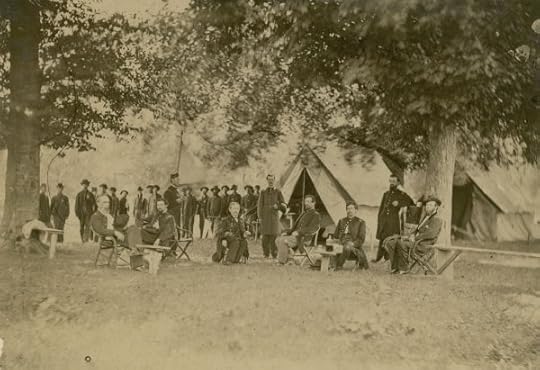 The headquarters of the 16th Wisconsin in camp in the field in Tennessee later in the war.
The headquarters of the 16th Wisconsin in camp in the field in Tennessee later in the war. I rallied those few men andbrought them to the major. Riding to the rear for other men to bring themforward, I met Surgeon George W. Eastman who rather sternly informed me that myplace was by his side to look for the wounded and dying. I had gone but a fewrods when I met Horace Bagg [Private of Co. A] and another man supportingGeorge M. Camp, shot through the upper part of the right ling. I asked him toget on my horses, assuring him that my horse was perfectly safe. He steadiedhimself by the high tree of the saddle and strange as it may seem to those whoknow how spirited an animal my black horse is, with myself leading and a man onthe other side urging we could not get that horse to walk at half his gait. Isaid we should not get to the boat for an hour at this rate (it was 2-1/2 milesoff) and I will find a team and get him aboard of it. I did so, and the instantI mounted my horse, he was off at the top of his speed. I verily believe the horseinstinctively knew that a dying man was on his back. [Private George M. Campdied of wounds April 10, 1862, at Savannah, Tennessee and is buried at ShilohNational Cemetery in grave 2919.]
By this time, the wounded anddying were crowding the way and Adjutant Sabin, a man of great versatility ofcharacter, called to me to find an ambulance for a man shot through the back.Having provided for all I met a passage to the hospital boat, who should I meetbut our brave Colonel Allen, safe and sound. ‘Well chaplain,” he said, ‘I amhappy to meet you again. Tell the boys I am going to make another stand back atthe next clearing at the log house.’ This was the eighth time the 16thWisconsin rallied at the command of the beloved colonel. No white feather showsitself yet as those untruthful Illinoisans reported of us!
At this last rallying, ColonelAllen received a musket shot in the forearm near the elbow, passing between andslightly fracturing the bones. Perfectly cool and self-possessed, he orderedthe boys to load flat down on the ground, for they were in a small ravine andunder cover of the fire of the enemy who were now passing down another shallowravine by thousands towards the river to drive our forces back from it andhence keep themselves from the deadly shells of the gunboats. Our boys stillchased them up, pouring in upon them a galling fire.
Adjutant Sabin, as amid the lastbold acts of the day, rode his newly captured horse to the top of the hill, drewhis revolver from his holsters, and discharged five shots from each, saving onein each for future emergencies. No white feather yet! For this deliberatecoolness by Adjutant Sabin, the Secesh returned him the compliment, their fireonly taking effect by a buckshot (for they fire a ball and two buckshot witheach cartridge) hitting the horse in the nose, which made the new war horseright about and forward march in double quick. This was the last fighting the16th Wisconsin did on Sunday.
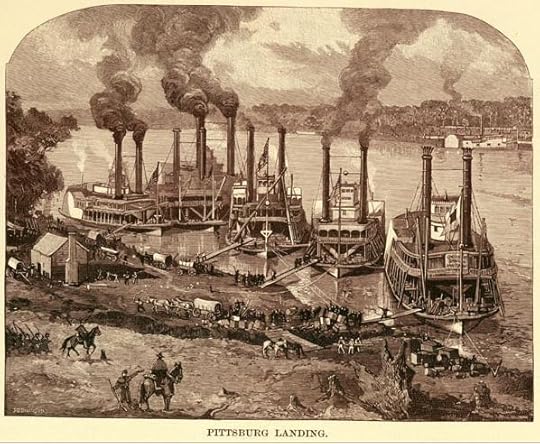 This scene would have been a familiar one to Chaplain Livermore: a row of steamboats lined up at Pittsburg Landing with their gangplanks reaching the shore. Thousands of discouraged Federal troops lined the embankment and a few Confederate shells landing nearby "got up a regular stampede. The whole side hill seemed in motion, making a break for the boats which began just then to back off from shore amid the deafening cry 'The Rebels are upon us!' The backing off of the boats heightened the alarm," Chaplain Livermore recalled.
This scene would have been a familiar one to Chaplain Livermore: a row of steamboats lined up at Pittsburg Landing with their gangplanks reaching the shore. Thousands of discouraged Federal troops lined the embankment and a few Confederate shells landing nearby "got up a regular stampede. The whole side hill seemed in motion, making a break for the boats which began just then to back off from shore amid the deafening cry 'The Rebels are upon us!' The backing off of the boats heightened the alarm," Chaplain Livermore recalled. Before this engagement, ColonelAllen told me I had best make for the boat and aid the surgeons and wounded andthat if I saw Captain [George H.] Fox [Co. B] to say to him from the colonel toreport himself at once where the colonel was making his last stand. The colonelevidently had much feeling over the captain’s leaving his company so early inthe morning and exhibiting such a passion to capture a horse which he hadsucceeded in doing, for he [Fox] was now away from his company riding LieutenantColonel Fairchild’s horses a mile and a half from the scene of the engagement!But the captain did not report himself per the colonel’s orders.
After I left Colonel Allen, Iwent to the boat, the City of Memphis. It was lying under the bank whereit reached an elevation of 60 feet and so steep that it had to be terraced. Here,I found the wounded gathering fast. Our physicians, Eastman and [Benjamin R.] Torry,I also found here and several other physicians perfectly overwhelmed withduties to the wounded and dying. They gave me orders to bring all of thewounded of the 16th Wisconsin aboard. To this order many a man oweshis life. For the guard would not ordinarily allow any to come on board unlessseverely or mortally wounded. But such was the continued coming of the 16ththey would let me pass without a word.
About 3 p.m., I ascended thatrugged hill again and what should salute my ears but the voice of Charlie,saying with mingled accents of grief and joy, ‘Hallo father, you are yet alive!’This was the first I had seen of him or he of me since 7 a.m. when the battleopened. Judge ye my joy to know that my boy was spared amid that terrible day’sslaughter.
At 4 o’clock or thereabouts,Colonel Allen sent word to Surgeon Torry that he was wounded. We at once starteddown the river to the boat. But just as we began dressing his arm, a few shellsfrom the enemy dropped amid the promiscuous crowd of thousands on the bank andgot up a regular stampede. The whole side hill seemed in motion, making a breakfor the boats which began just then (as all had steam up) to back off fromshore amid the deafening cry, ‘the Rebels are upon us!’ The backing off of theboats heightened the alarm.
I handed the Dr. Torry the bowlI was using to catch the blood from the arm of Colonel Allen, fearing for thesafety of Charlie with the horses on shore in such an alarming stampede. The gangplankwas literally hemmed full and men crowded off into the river in a rush to geton board the boats and away from the advancing foe. The boat backed off just asI came on to the gang and met the rushing crowd and let the gangplank fall intothe river. I then thought it was each man for himself and acted accordingly,literally making a bridge of the heads and shoulders of those crowding thegang. I made my way to shore, getting wet only to the top of one bootleg. Allscrambled up the gangplank and none were drowned. Charlie looked as though he evidentlybelonged to a white race of people!
The gunboat Lexington,lying not half a mile up the river, kept the enemy in check. As I was leavingthe boat Planet with Surgeon Torrey on it and the colonel, I heard the captain say,‘I am going over the river after Buell and his forces.’ I took my horse androde to the top of the hill exclaiming at the top of my voice, ‘Hold on men!The boats are only backing off to go over the river for Buell and his forces!”This was to the excited and terror-stricken crowd like oil to the troubledwaters and the stampede ceased.
Sources:
Letters from Chaplain Lark Southgate Livermore, 16thWisconsin Volunteer Infantry, Berlin City Courant (Wisconsin), May 15,1862, pgs. 1-2, also, July 10, 1862, pg. 2
Daniel A. Masters's Blog
- Daniel A. Masters's profile
- 1 follower



